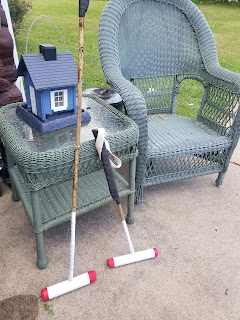The more unique your business, the more likely you will have a certain percentage of customers that love your business and a certain percentage of customers that don't understand it. Before you pull your hair out in frustration be mindful that unhappy customers can be an amazing source of information. They will tell you the things you might not want to hear.
You have an obligation to find out from customers what they don't like so you can consider that information in changing your approach. For examples, my mallets started out pretty terrible and I sold them cheap in exchange for feedback (i.e. like an informal customer market study) and each time I got the feedback I improved the mallet and sold another trying to raise the price and quality.
I have two examples Customer Joe and Customer Angie that might help us understand the value of positive and negative feedback.
Customer Joe: Asked about sizes and then ordered two mallets. He did not like the handles and the thin shaft. He said the quality is poor and the handles are not big enough. He asked for a return and even called them "poo poo". We have an easy return policy. No worries!
Curious about his comments we asked Joe for some advice on how to improve our product so we can improve our start-up (i.e. continuous improvement and CRM). To our amazement he said that the quality of the mallet was actually good but he has very large hands and most mallets don't fit him well (Once I received the return I also noticed the handle felt a little thin. Since these are handmade there may have been a little too much variability in product outcomes. To solve this we should implement an inspection step to ensure consistency. Thanks Customers Joe!)
We were unaware our unhappy customer had a great need for a much wider handle and we could have customized and resolved this issue for him. Turning that frown upside down! 😟😁 Next time someone wants to return a product let us talk with them and see what we can do to improve. (It actually costs small business when a customer initiates a return. In my case like $20.)
The second follow up response we got from our customer offered a more objective analysis than his first assessment and that allowed us to gain some deeper feedback. We want to minimize incorrect product understandings customers may have so we went back and reviewed our listing to ensure it has the most accurate information as possible.
We checked our listings for accuracy and made a few small tweaks when we found something didn't match. All in All the listing information was accurate. You can see see the Ebay listing HERE. Some tweaks included making certain characteristics more obvious. What we did learn is that we have to connect with customers and know our customer, know our customer and know our customer.
Customer Angie:
Angie bought a mallet a few months ago and loved it! She used her mallet regularly and sent us comments stating she loved the quality, loved how light it was, and enthusiastically said the mallet helped her become a better player!
She bought another one! That is what want to see!
When customers are happy they come back over and over because your product is associated with positive feelings. They also give good ratings and refer their friends to buy from your company as well. In our market we would want polo trainers and club managers to refer us to their clients. Keeping our customers happy is central to our strategic approach.
Business Lesson 1: Positive and negative customer feedback can provide insight into the product. Using that information to improve the product and/or service leads to continuous improvement.
Business Lesson 2: Ask lots of questions and find ways to turn customer concerns into opportunities for future products/services.
Escanaba Polo Mallet Company isn't just a mallet company we want to teach others what we discover from launching a business with under $500 in capital. We are a good works company that includes good works and public benefit in our ROI.


No comments:
Post a Comment